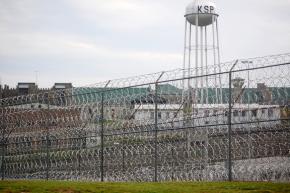Today’s unfinished business
, an anti-police brutality activist and founding member of the Campaign to End the New Jim Crow, explains what the 13th Amendment means to him.
THIS IS African History Month. For the past week, I have been watching and re-watching The Abolitionists, a two and a half-hour documentary on PBS. It covers the abolitionist movement from the early 19th century to the Reconstruction period.
Watching the dynamics of that struggle for the ending of slavery had me glued to the screen and taking notes. The chief players were William Lloyd Garrison, the publisher of the anti-slavery newspaper, The Liberator; Nat Turner, who led am 1831 slave rebellion that killed slave owners and freed slaves; Harriet Beecher Stowe, who wrote the novel Uncle Tom's Cabin; and Frederick Douglass, former slave, orator, publisher of the North Star and organizer. Oh, and the most prominent figure, Abraham Lincoln.
The Abolitionists is a historical documentary about the struggle to end slavery. The ending of the most brutal war in American history and the passage of the 13th Amendment were supposed to be the definitive ending of that period in American history. However, when I look back from the perspective of the present, I am confronted with the question: What has changed? I can't avoid the answer: Very little.
The 13th Amendment states, "Neither slavery nor involuntary servitude, except as a punishment for crime whereof the party shall have been duly convicted, shall exist within the United States, or any place subject to their jurisdiction." The "exception clause" leaves slavery still in effect for those convicted of crimes.
Today, America, with 5 percent of the world's population, has 25 percent of the world's prisoners. Those prisoners have been "duly" convicted of crimes and are therefore slaves. There are presently 2.5 million prisoners in the United States of America and another 5 million under the control of the criminal justice system.
These numbers are unprecedented in the history of human beings on the planet Earth. There are more Black men under the control of the criminal justice system then there were in slavery in 1850, 10 years before the Civil War.
African Americans continue to occupy the base of the social and economic pyramid. You can see them lined up outside of the criminal courts in every state in the country. You can go into those courtrooms and watch them processed as though they were on a conveyor belt into the prison system or to the clerk's office to be stripped of their meager wealth by imposition of fines and surcharges and sent to perform un paid labor called "community service."
What has changed?
The struggle for "change" is unending, something we must come to realize. The new form of slavery (from private ownership to state ownership) is "the new Jim Crow" and has the same intent and purpose--to rob us of our labor and to keep us powerless. By placing us in these cages, they have managed to do all of the things they did to us in slavery, apartheid and now mass incarceration.
State and federal governments have taken our right to vote, weakened the ability of our communities to assert their interest in the political process, fractured our families, turned our schools into feeder systems for their modern slavery and turned our communities into open-air prisons.
The question now becomes, "How must WE change" to address the unfinished struggle of the abolitionist movement of the past. The work I do in my roles as organizer and community activist requires me to stay in student/researcher mode. My life experience has convinced me that we live in a world of constant change, perpetual change and chaos.
This state of reality requires us to live in the world as though we are students, critical thinkers, always prepared for change. But we can't merely be critical thinkers on our own. There is an urgency in building unity and struggles with others of like mind, to build the strongest force possible to challenge mass incarceration.



